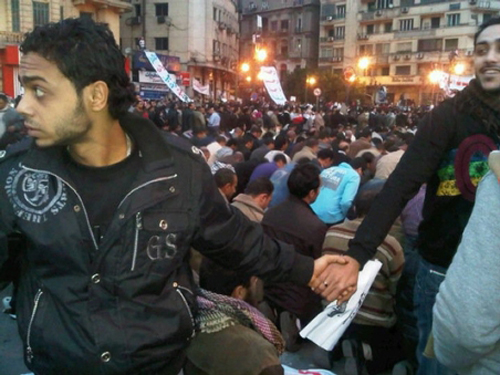
Of all the images to come out of the North African uprisings, this is the one that consistently makes me tear up.
By Clay Shirky
Author, 'Here Comes Everybody: The Power of Organizing Without Organizations'
Posted: March 25, 2011 01:19 PM
Courtesy Of "The Huffington Post"
These are Coptic Christians in Cairo's Tahrir Square, holding hands around Muslims during Friday prayer, to protect them from surprise attack.
We could do this. We could do this here, in the United States, to keep our Muslim citizens safe. All of us, Christians and Jews and atheists, anyone committed to the First Amendment, to the idea that religious freedom is essential to American society, could join hands to protect Muslims living here from rising prejudice.
The people of the United States are capable of visiting horrors on those we decide aren't really like "us" enough to count: Blacks owned, women silenced, Jews segregated, gays repressed, Japanese interned, the catalog of American hate and fear runs to many pages.
And now it's happening again, with political fear-mongering around the Park51 Islamic community center in New York and Rep. Peter King's recent grandstanding on radicalization in the American Muslim community fueling a 'guilty until proven innocent' attitude towards Muslim citizens and organizations. We should certainly worry about murderous homegrown radicals, but that's because murderous radicals are dangerous, not because they are religious; David Koresh, Timothy McVeigh, and David Brian Stone were all homegrown and all evil, but none of them were Muslim.
I don't know how bad this kind of prejudice will get, but it will get worse than today. To counter this threat, we have to integrate the Muslim experience into the American experience, just as the Protestants came to shed anti-Catholic prejudice, and the Christians anti-Jewish prejudice. As imperfect as those expansions have been, even today, the United States is a better place for having widened our sense of who constitutes "us," of having engaged in what Richard Rorty called justice as larger loyalty.
I don't know how to do this, how to keep people safe from the bigots who want the very fact of Muslim faith or heritage to generate suspicion and oppression. I do know some ways to start. We can respond to prejudice when we hear it; the thing that woke me up was hearing one of my cousins argue that a mosque in lower Manhattan was an affront to American identity, as if Muslim citizens were inherently less American than Christian ones.
We can care about how Muslims are treated, here and abroad. Democratic governments respond to public preferences; bigotry thrives on the silence of those of us who support freedom of religion, but not out loud. (Hence this post.) Democratic governments also respond to voters; it's a safe bet that the organizations helping register Muslim-American voters in 2008 will do so again in 2012, and they need our help.
We can donate. I've given money to the Muslim Public Affairs Council, and to Irshad Manji'sProject Ijtihad (ijtihad meaning, roughly, independent reasoning.) These are of course political choices -- Project Ijtihad is explicitly progressive and feminist -- and your politics may run more to What Unites Us, an organization set up to combat anti-Muslim prejudice, to the American Muslim Law Enforcement Officers Association, or any number of local or interfaith organizations opposed to religious bigotry.
Perhaps most importantly, we can tell people we've donated or participated. It will be better to donate $5 to a group combatting anti-Muslim prejudice and then announce it on Facebook or Twitter, than to give $500 quietly. (I'm using #AfterTahrir.)
As President Bush said at the Islamic Center of Washington
Those who feel like they can intimidate our fellow citizens to take out their anger don't represent the best of America, they represent the worst of humankind, and they should be ashamed of that kind of behavior.
Bush was right. America's finest hours have always been integrative and our most shameful ones prejudiced. Now, again, we have to pick, and we have an opportunity to learn from the protesters in Tahrir what political courage looks like.
Crossposted from Shirky.com.




No comments:
Post a Comment